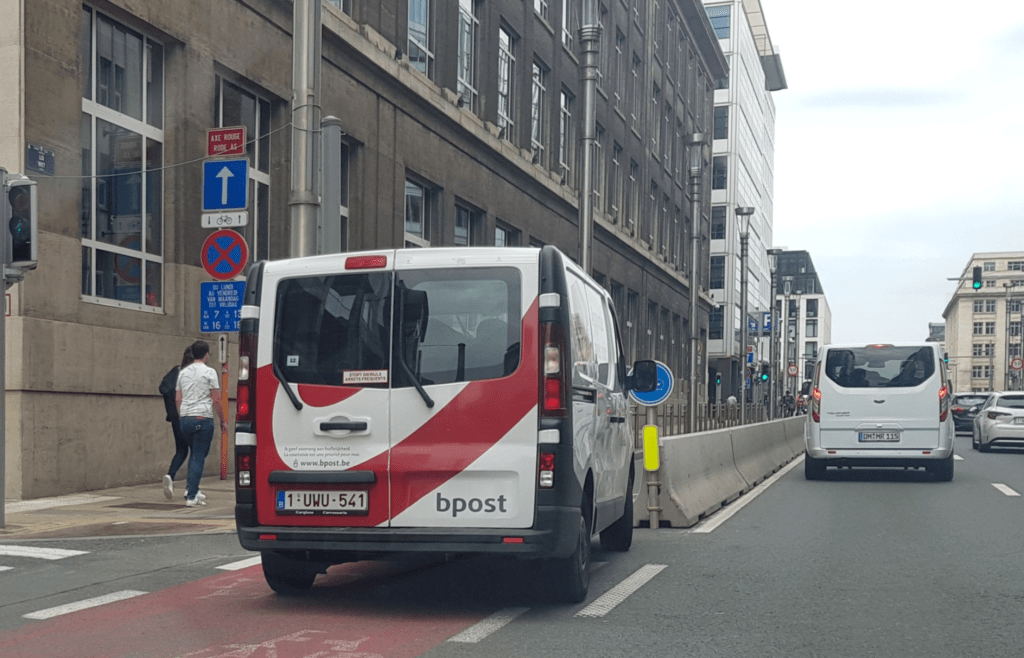A group of Brussels citizens have formed a collective to address the issue of illegally-parked Bpost couriers in the Belgian capital, and they’ve come prepared with evidence of how extensive the problem is.
About a dozen Brussels residents are joining forces to address this issue, according to reporting from Bruzz, and they’re sharing an interactive map of wrongly-parked Bpost cars they’ve created, complete with photos.
In them, Bpost cars can be seen parked in cycling lanes and pedestrian crossings, or in ways that leave their vehicle blocking or even completely occupying a pavement.
“Experience has taught us that in the vast majority of cases, there were indeed many alternatives to parking on the footpath, the zebra crossing, or the bicycle path,” Bastien De Zutter, one of the initiators of the collective, told Bruzz.
“We often see in the photos that there was a parking space a few houses away, or that it was possible to stop on the carriageway. Finally, there is no shortage of garage doors, in front of which short stops are allowed.”
Consultations between Bpost and the cabinet of Elke Van den Brandt, Minister of Mobility, Public Works and Road Safety (Groen), are planned for September.
“Together we will try to reach a solution,” said Veerle Van Mierlo, spokesperson for Bpost.
The interactive map of wrongly parked Bpost cars has been maintained since 2018 and has 62 different examples with photos.
While the mail couriers certainly aren’t the only ones in Brussels to park in bike lanes or otherwise illegally, advocates say their status as an official Belgian postal service sets a poor example.
“It's mainly about Bpost cars because they are enormously visible on the public road,” said De Zutter.
“It is unfortunate because as a semi-governmental company you have to set an example. In this way, they create a climate in which parking wrongly is allowed.”
While Bpost says they also want a solution, they point out some of the difficulties couriers face in the capital: the nineteen different Brussels municipalities often have different parking policies; more packages are being delivered by car due to record highs in online orders as a result of the pandemic; and people don't want to wait for their mail and packages.
“Applying for parking permits everywhere would be very expensive,” Van Mierlo said of the first point.
And parcel companies GLS and DPD also chimed in on the difficulties couriers face.
“Everyone wants their parcel in the mailbox as quickly as possible,” said Luc De Schrijver, GLS CEO.
“A courier cannot always find a free parking space and then walk a mile with a parcel. So people sometimes park where they're not supposed to.”
Frank Jahn, a board member for DPD Benelux (which holds around 15 percent of the Belgian market), agreed.
“If the drivers have to search for a parking space in every street for ten minutes, we can no longer deliver everyone's parcel on time,” Jahn said.
“The bad parking gives us a bad name, but we also want our customers to get their parcels on time. We struggle with this dilemma.”
But the citizens' collective says this dilemma is a false one and called on people to “not fall into that trap” as it sends the wrong signal to drivers and then nothing changes as a result.
The collective says that the issue is structurally embedded within parcel delivery companies.
“Pointing the finger at rushed couriers who are under pressure is pointless,” they argued.
“It’s up to the top management to face this dangerous situation and take action.”
The Brussels Times

